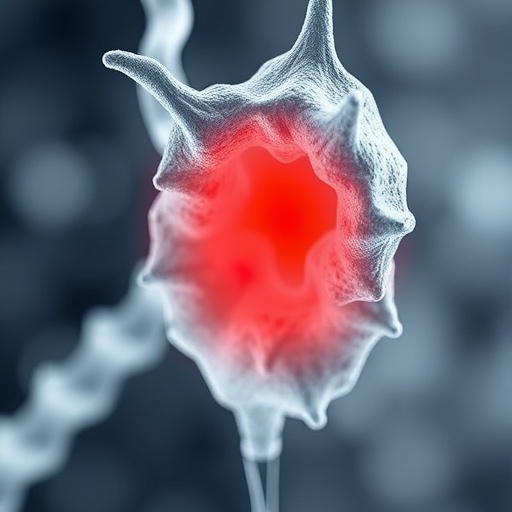In recent research that sheds light on the complex interactions between parasites and their hosts, a team of scientists led by Zhou, YJ., along with Li, ZY. and Yu, Y., has conducted a profound proteomic analysis of excretory-secretory products from the adult stage of Toxocara canis. This nematode, commonly associated with dog infections, is notorious for its potential to cause zoonotic diseases in humans, particularly affecting the eye and central nervous system. The study, published in BMC Genomics, delves into the biochemical profiles generated by this parasite and how they can influence host biology.
The core of this groundbreaking research lies in understanding how Toxocara canis leverages its excretory and secretory products (ESPs) to maneuver and manipulate its host environment. These products play critical roles in immune evasion, nutrient acquisition, and the overall survival of the parasite within its host. By utilizing sophisticated proteomic techniques, the researchers were able to identify a wide array of proteins secreted by Toxocara canis. This extensive dataset not only highlights the complexity of the molecules involved but also underscores the potential for these proteins to impact host physiological responses.
Through meticulous mass spectrometry and bioinformatics analysis, the study identifies multiple protein classes, including enzymes and other functional proteins, that likely aid Toxocara canis in adapting to its host. For instance, the secreted proteases could be pivotal in degrading host tissues or modulating immune responses, effectively reducing the host’s ability to mount a robust defense against infection. This functional characterization of the ESPs provides insights that were previously obscured, opening avenues for significant advances in parasitology.
Moreover, the research investigates how age and metabolic state of the Toxocara canis influences its secretion mechanisms. Understanding this facet is crucial as it can help pinpoint why certain infections lead to more severe clinical outcomes, particularly in vulnerable populations, such as young children or immunocompromised individuals. The differential expression of specific proteins at various life stages of the parasite hints at adaptive strategies employed to ensure survival and propagation within the host ecosystem.
Furthermore, the analysis also explores the immunological implications of the identified protein profiles. The work reveals that certain ESPs can modulate the host immune response, potentially leading to an imbalance that favors parasite survival. This immune evasion tactic could elucidate why Toxocara infections are often asymptomatic initially, allowing the parasite to persist undetected for extended periods. The researchers argue that these findings are paramount in developing targeted therapeutics and vaccines that can effectively impede the life cycle of Toxocara canis.
In addition to therapeutic implications, the study highlights the potential of these ESPs as biomarkers for diagnostic purposes. Given that Toxocara canis infections can be challenging to diagnose, especially in asymptomatic patients, identifying specific proteins associated with the parasite might enhance early detection methodologies. The researchers express hope that such diagnostic advancements could significantly reduce the morbidity associated with Toxocara infections, particularly in highly affected regions.
One of the significant advancements in the field is taking a systems biology approach. The integration of proteomic data with genomic and metabolomic assessments allows for a holistic view of Toxocara canis and its interaction with the host. This integrative methodology offers a promising framework for future studies on parasitic diseases and their management. By acknowledging the complexity of host-parasite interactions, researchers aim to devise more effective strategies to combat infections that have persisted throughout human history.
Moreover, the research underscores the importance of continued exploration into the interactions of other parasitic nematodes and their respective hosts. As Toxocara canis serves as a model organism, the findings could potentially be extrapolated to understand related parasitic diseases. The wealth of data obtained through this proteomic analysis encourages further investigations, potentially leading to the identification of novel treatment strategies against various parasitic infections.
In light of the rising incidence of zoonotic diseases, the implications of this research extend beyond academic interest. With global changes, urbanization, and climate factors, understanding how parasitic infections operate within their hosts becomes increasingly vital. This study serves as a clarion call to the scientific community, stressing the need for comprehensive research that addresses the health threats posed by neglected tropical diseases.
As public health officials and researchers rally to address the implications of this research, awareness campaigns stressing the importance of pet hygiene and regular veterinary care could prove invaluable. Such preventive measures may mitigate the risk of transmission to humans, thus safeguarding public health. By blending basic research with public health initiatives, both arenas can cooperate to enhance community health standards.
This proteomic analysis serves as a critical beacon for future research endeavors in parasitology, immunology, and host-pathogen interactions. By understanding the intricate biology of Toxocara canis, researchers are poised to not only eliminate this parasite but also enhance the overall landscape of therapeutic options available for managing parasitic diseases.
In conclusion, the work conducted by Zhou and his colleagues represents a significant leap forward in understanding the proteomic landscape of Toxocara canis. The insights gained from the study open new doors for research and innovation in both academic and therapeutic settings, ultimately contributing to more effective control measures against this persistent and concerning parasitic infection. As we continue to unravel the complexity of host-parasite dynamics, we can hope for a future where fewer individuals suffer the consequences of zoonotic infections.
Subject of Research: Proteomic analysis of Toxocara canis excretory-secretory products and their role in parasite-host interactions.
Article Title: Proteomic analysis and functional characterization of excretory-secretory products from adult Toxocara canis: insights into parasite–host interactions.
Article References:
Zhou, YJ., Li, ZY., Yu, Y. et al. Proteomic analysis and functional characterization of excretory-secretory products from adult Toxocara canis: insights into parasite–host interactions.
BMC Genomics 26, 806 (2025). https://doi.org/10.1186/s12864-025-12030-w
Image Credits: AI Generated
DOI: 10.1186/s12864-025-12030-w
Keywords: Toxocara canis, excretory-secretory products, proteomics, host-parasite interactions, immune evasion.




